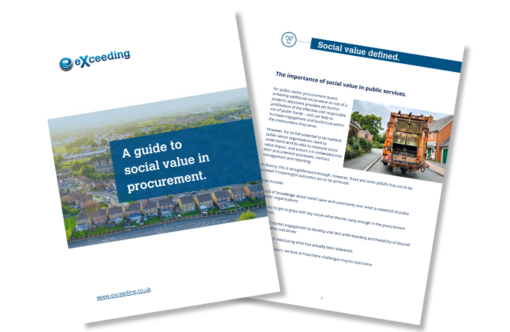George Orwell, in his allegorical novel Animal Farm, wrote: “All animals are equal, but some are more equal than others”. Certainly, the idea that there are inequalities in society is nothing new.
In the UK, we talk about the North-South divide, about town vs country, and about pockets of deprivation along our coastlines, in former industrial areas, and in some inner cities in the North and Midlands.
For local authorities operating in deprived areas, there is urgent need for investment in major projects to expand infrastructure, improve connectivity, and create the jobs and homes needed to boost the local economy.
That’s why, at eXceeding, we welcomed the introduction by the Government in its 2021 Autumn budget statement of the Levelling Up Fund, which we hope will make it easier for local authorities to initiate the change they want to see and start to break down some of these inequalities.
The Levelling Up Fund – what’s good?
The Levelling Up Fund is a pot of £4.8 billion which has been set aside by the Government to fund investment in so-called ‘high-value local infrastructure’.
Created as part of the Government’s ‘Levelling Up’ agenda aimed at boosting UK economic recovery, incentivising regeneration and improving growth, it is open to all local authorities across the UK that can successfully make a case for investment that will have ‘a visible and tangible impact’ on people and local communities.
Jointly managed by the Treasury; the Ministry of Housing, Communities and Local Government; and the Department for Transport, it is intended to end the siloes in Whitehall that hamper strategic investment.
The Government hopes the Levelling Up Fund will allow for a focus on genuine local priorities, including regenerating town centres and high streets; investing in local transport; and upgrading local cultural and heritage assets.
“People want to be able to look around their towns and villages and recognise that their homes and communities are better off than five years ago. In this vein, the most impactful infrastructure projects – those that help bring pride to a local area – are often smaller in scale and geography: regenerating a town centre, local investment in cultural facilities or upgrading local transport infrastructure.”
– Extract, Levelling Up Fund prospectus
Priority is given to bids from local authorities in the areas identified by the Government as most needing investment. This includes ex-industrial areas, deprived towns, and coastal communities.
“A new bridge or a bus lane makes the journeys of local people easier; town centre improvements help local businesses and cement pride in a place; and upgrades in local heritage sites strengthen the local economy and build civic identity. These are things that people rely on every day in communities up and down the country – the infrastructure of everyday life.”
– Rt Hon Rishi Sunak MP, Chancellor of the Exchequer
The good intention is certainly there, but how does the Fund stack up in practice?
The Levelling Up Fund – the challenges
With an opportunity as potentially good as this one, there are inevitably going to be challenges – and accessing the Levelling Up Fund is no different.
The maximum funding available for any one project is £20 million per local authority, with the exception of major road schemes, which may be eligible for up to £50 million investment.
As with any competitive opportunity, the quality of the application is key. With bids ‘graded’ on assessments of need, deliverability, strategic fit with local priorities, and value for money, local authorities need to put forward their case persuasively, ensuring it scores highly in all these areas, in order to secure investment for their specific locality.
Projects should also:
- Demonstrate support from local stakeholders, including local businesses, public transport providers, police and emergency services, community representatives, environmental groups, universities and further education colleges, and their local MP where possible;
- Be aligned to and support net zero goals by adopting and supporting innovative clean tech, supporting the growth of green skills and sustainable supply chains, or being based on low or zero carbon best practice;
- Be delivered to budget, as no extensions to funding are available to meet cost overruns.
And if all that wasn’t enough, there is also an element of needing to get it right first time. The total number of bids a local authority may submit during the lifecycle of the Fund equates to the number of MPs whose constituency lies entirely within their authority boundary, and they may only have one successful bid for each of their allocated number of bids.
What does this mean for local authorities?
All this presents an added challenge for local authority bid-writing and procurement teams who may already be at capacity and struggling to manage the complexities of operating in a post-Covid, post-Brexit, post-Grenfell environment.
They may not have the expertise and experience in-house to prepare bids of this size and magnitude, taking all the different components and requirements into account. There may be a need for new procurement processes that align with the funding, and to source new or different suppliers.
At eXceeding, we want to help lighten the load, and we’re already working with local authorities across the UK to supplement their existing skills and knowledge, and to provide the tools and processes that equip them for success.
What does eXceeding have to offer?
- First of all, we have the capacity and expertise. Our network of bid consultants provides expert bid strategy, planning, writing and review services to the public, private and third sectors, working on many hundreds of bid documents every year.
- Thanks to our consultants’ combined experience and market knowledge, we’ve developed a proven methodology that is quicker and more cost-effective for our clients than preparing bids in house, and results in a significantly better chance of success.
- An experienced, professional bid writer will have no difficulty in putting forward a compelling case for investment by clearly articulating not only the need for investment, but also how it fits with the strategic priorities of the local area and meets all the other stated requirements. For more on why hiring a professional bid writer is a good idea, read our blog on this topic.
- We also have the tools for success. Our access to a variety of public sector frameworks allows organisations to procure the full range of goods, works and professional services.
- We can engage in pre-award discussions with suppliers and access their recommendations for improving specifications or contracts, as well as benefit from our expert advice on setting SLAs and KPIs and getting value for money.
- Our supplier marketplace knowledge means that procurement benefits from the creativity and innovation of the most forward-thinking and dynamic suppliers in each category.
- There is also a clear and robust procurement process that aims to create genuine buyer-supplier partnerships built on shared goals, allowing for progress to be made towards public sector goals like increasing supplier diversity, investing in local SMEs, sustainability and reaching net zero targets.
To recap, that’s:
- A compelling case
- Value for money
- Creativity and innovation
- A clear and robust process
- A greater chance of success.
In conclusion
Here at eXceeding HQ, we’re excited about the potential of the Levelling Up Fund to do great things but, as always, the proof is in the pudding.
We share the view of the Institute of Economic Development, in its early response to the Levelling Up agenda, that there is a need for a clear view of what success looks like, long-term strategies, and re-distributive intervention. But, perhaps before all this, we also need to have confidence that change is possible.
Only by believing that we can succeed in reducing inequalities in our society will we be able to take the necessary actions that result in its transformation.
“Confidence building within disadvantaged places is the foundation for Levelling Up success; it is what, at a fundamental level, enables those sparks of potential to be ignited. […] If people do not believe that their community can succeed, then it won’t.”
– Lorna Young, marketing and rural economic development consultant, writing for the Institute of Economic Development in its early response to the Levelling Up agenda
At eXceeding, we believe. Local authorities that dare to dream and want to find out more about working with eXceeding can contact us here or book a free appointment using the form below.





Comments
This post has no comments yet...